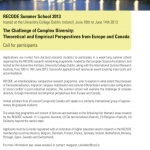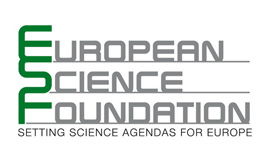The Challenge of Complex Diversity: Theoretical and Empirical Perspectives from Europe and Canada
RECODE Summer School,
University College Dublin, 10th to 14thJune 2013
 Applications are invited from doctoral research students to participate in a week-long summer school organized by the RECODE research networking programme, funded by the European Science Foundation, and hosted by the Humanities Institute, University College Dublin, from 10thto 14thJune 2013. Successful applicants will receive an award covering travel costs and accommodation.
Applications are invited from doctoral research students to participate in a week-long summer school organized by the RECODE research networking programme, funded by the European Science Foundation, and hosted by the Humanities Institute, University College Dublin, from 10thto 14thJune 2013. Successful applicants will receive an award covering travel costs and accommodation.
RECODE, an interdisciplinary, comparative research programme, aims to explore to what extent the processes of transnationalisation, migration, religious mobilisation and cultural differentiation entail a new configuration of social conflict in post-industrial societies (see http://www.recode.fi/). The summer school will examine the challenge of complex diversity, through theoretical and empirical perspectives from Europe and Canada. The week long programme will consist of lectures and seminars on the following four thematic areas covered by the RECODE network: (1) Linguistic diversity; (2) De-territorialized diversity; (3) Religious diversity; (4) Solidarity beyond the nation-state.
Participating lecturers and seminar leaders include Gianni D’Amato (University of Neuchâtel), Rainer Bauböck (EUI, Florence), Anette Borchorst (Aalborg University), Susanne Brauer (Paulus-Akademie Zürich), Linda Cardinal (University of Ottawa), John Erik Fossum (University of Oslo), Alain Gagnon (UQAM), François Grin (University of Geneva), Riva Kastoryano (CNRS-CERI-Sciences Po, Paris), Peter A. Kraus (University of Augsburg), Jocelyn Maclure (Laval University), Michel Seymour (U. Montréal), Birte Siim (Aalborg University).
Summer School Programme
Monday 10th June:
Morning Session – 9.30-13.00:
9.30: Opening remarks
10.00-11.00: Plenary Lecture
Rainer Bauböck “It’s all political, stupid! Why and how cultural difference matters for democracy”
—- 11.00-11.30: Coffee break —–
11.30-12.30: Plenary Lecture
Michel Seymour “Political Liberalism and the Recognition of Peoples”
12.30-13.00: Panel discussion
—-13.00-14.00: Lunch —-
14.00-16.00: Plenary Session – Introductions by students
—- 16.00: Opening reception —-
Tuesday 11th June: Religious Diversity
Morning Session – 9.30-13.00:
9.30-10.30: Lecture and discussion
Susanne Brauer “The role of religious beliefs in clinical practice: ethical considerations”
10.30-11.30: Lecture and discussion
Jocelyn Maclure “Religious Accommodations and Fairness”
—- 11.30-12.00: Coffee Break —-
12.00-13.00: Lecture and Discussion
Gianni D’Amato “(Religious) Diversities and the Judiciary”
—-13.00-14.00: Lunch —-
14.00-16.30: Group workshop and student presentations led by Gianni D’Amato, Susanne Brauer, and Jocelyn Maclure.
Wednesday 12th June: Linguistic Diversity
Morning Session – 9.30-13.00:
9.30-10.30: Introduction to topic
Peter Kraus: Complex Diversity and Language Politics
Margaret Kelleher: Historical and Contemporary Language Issues in Ireland
10.30-11.30: Lecture and discussion
Linda Cardinal “Language Regimes and State Traditions”
—- 11.30-12.00: Coffee Break —-
12.00-13.00: Lecture and discussion
François Grin “Economic Approaches to the Valuation of Language Policy Strategies”
13.00-13.30: Concluding discussion
—-13.30-14.30: Lunch —-
14.30-16.30: Group workshop and student presentations led by Peter Kraus, François Grin, and Linda Cardinal.
Thursday 13th June: De-Territorialized Diversity
Morning Session – 9.30-13.00:
9.30-10.30: Introduction to topic
Riva Kastoryano
10.30-11.30: Lecture and discussion
Alain G. Gagnon: Rooted Cosmopolitanism as a by-product of Liberal Nationalism
—- 11.30-12.00: Coffee Break —-
12.00-13.00: Lecture and discussion
John Erik Fossum: Cosmopolitanisation in the EU and Canada?
—- 13.00-14.00: Lunch —-
14.00-16.30: Group workshops and student presentations led by John Erik Fossum, Riva Kastoryano, Alain Gagnon, Birte Siim, Anette Borchorst and Edward Koning
Friday 14th June: Solidarity Beyond the Nation State
Morning Session – 9.00-12.30:
9.00-11.00: Lectures and discussion
Birte Siim “Trans-national Challenges to Democracy, Citizenship and Multiculturalism”
Edward Koning “The politics of immigrants’ social rights in Western welfare states”
—-11.00-11.30: Coffee Break —-
11.30-12.30: Lecture and discussion
Anette Borchorst: “Immigration, Europeanization, and Solidarity”
—-12.30-13.30: Lunch —-
13.30-15.00: Closing Plenary.
Summer school ends at 15.00.
Download RECODE Summer School Schedule
Description of thematic sessions
Day 1:Introductory
Day 2 Religious diversity:Religion has lost its role as a fundamental reference in Western societies, but it has not given way to completely secularized forms of subjectification. It continues to be in a post-secular setting a relevant social force that pervades the public, private and intimate realms. Therefore, the session will address the following themes: How to interpret secularism and laicité in post-secular societies? What is the role and option of religion in public space? Which ethical and legal parameters should be taken accountable in religious plural societies? What are workable public policies for religious co-existence?
Day 3 Linguistic diversity: The session will be devoted to assessing the impact of linguistic diversity and multilingualism on society and politics in Europe and Canada from a multi- and trans-disciplinary perspective. It will address the following themes: (a) language and identity-formation under conditions of complex diversity; (b) language, immigration, and integration; (c) multilingualism and democracy; (d) political communication in transnational contexts; (e) linguistic justice.
Day 4 De-territorialized diversity: Politics has traditionally been conceptualized and organized along territorial lines. Today, however, the confluence of globalization, cosmopolitanisation and Europeanisation have given new impetus to the development of transnational communities. The session will address the following questions: What is meant by transnational communities? How salient are they in today’s EU and Canada? What is the relationship between transnationalism, nationalism and cosmopolitanism? Is cosmopolitanism the way forward?
Day 5 Solidarity beyond the welfare state: The session will address multicultural politics within and beyond welfare states focusing on the following themes:(a) the changing politics of diversity and belonging;(b) old and new forms of diversities and inequalities; (c) the boundaries of solidarity during the economic crisis.
Eligibility
Applications can be accepted only if they satisfythe two following criteria:
- Applicants must be currently registered with an institution of higher education and/or research in the RECODE membership countries (Austria, Belgium, Denmark, Finland, France, Germany, Ireland, Netherlands, Norway, Portugal, Spain, Sweden and Switzerland).
- Applicants must be currently registered PhD students in disciplines and fields of interest relevant to the themes of the school and RECODE network.
Documentation requested from applicants
All application material must be submitted in pdf format to recode2013@ucd.ie for the attention of Professor Margaret Kelleher, RECODE Irish representative, by 31 March 2013.
- Letter of application (max 500 words) detailing a) your institutional affiliation, b) nature and length of programme for which you are registered, c) subject of research project, and explaining how you will benefit from the workshop.
- A short essay (max 500 words) addressing directly one or more of the themes of the workshop sessions from the perspective of your research project.
- CV (max. 1000 words).
- Letter of support from your research supervisor (recommended length: c. 500 words).
NB: Applications exceeding the indicated word restrictions and late applications will not be eligible. Incomplete applications will not be accepted.
Selection criteria and process
The selection will be carried out by a dedicated panel of reviewers, appointed by the Recode Steering Committee. Decisions will be based on the following criteria:
- Suitability of student’s subject of study to summer school themes;
- Quality and originality of the short essay;
- Thematic balance, i.e. to ensure representation of all four thematic areas;
- Balanced geographical and gender representation amongst the participants.
Timeline for application and selection
- 31 March 2013 Deadline for submission of application (pdf format) to recode2013@ucd.ie
- By end April 2013 Notification of successful applicants
A certificate of participation will be issued to all summer school attendees. Credit allocations will be the responsibility of the student’s own institution.
The ESF award will cover travel costs (economy class), meals and accommodation (5 nights); travel costs will be reimbursed to participants following the event.
CALL FOR RECODE SUMMER SCHOOL 2013 closing date 31 March
Download RECODE Summer School poster

